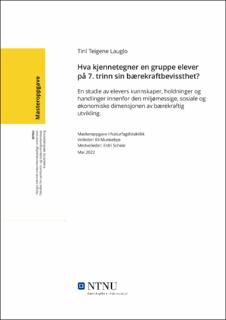| dc.contributor.advisor | Munkebye, Eli | |
| dc.contributor.advisor | Scheie, Eldri | |
| dc.contributor.author | Lauglo, Tiril | |
| dc.date.accessioned | 2022-07-23T17:21:53Z | |
| dc.date.available | 2022-07-23T17:21:53Z | |
| dc.date.issued | 2022 | |
| dc.identifier | no.ntnu:inspera:105121005:37933041 | |
| dc.identifier.uri | https://hdl.handle.net/11250/3008071 | |
| dc.description.abstract | Denne masteroppgaven ser nærmere på hvordan en gruppe elever på 7. trinn sin bærekraftbevissthet er. For å få en dypere forståelse for elevenes bærekraftbevissthet undersøkes elevenes kunnskaper, holdninger og handlingsmønster, innenfor miljø, sosiale og økonomiske dimensjonen av bærekraftig utvikling (BU). I den forbindelse forsøker studien å gi svar på tre forskningsspørsmål. Studiens første (1) forskningsspørsmål undersøker hvilken gjennomsnittlig bærekraftbevissthet en gruppe elever på 7. trinn har. Det andre (2) forskningsspørsmålet ser på hva som kjennetegner bærekraftbevisstheten hos elevene med fokus på kunnskap, holdninger og handlinger. Det tredje forskningsspørsmålet (3) innebærer hva som kjennetegner elevenes bærekraftbevissthet med fokus på miljødimensjonen, den sosiale og den økonomiske dimensjonen av bærekraftig utvikling.
Studiens datainnhenting er gjennomført ved metodetriangulering i form av spørreundersøkelse og intervju. Studien er gjennomført i et samarbeid med Critical Thinking in Sustainability Education (CriThiSE) prosjektet ved NTNU, med den hensikt å tilpasse et internasjonalt spørreverktøy på bærekraftbevissthet til norsk kontekst. Den kvantitative spørreundersøkelsen er gjennomført på 30 elever ved 7. trinn, og de kvalitative intervjuene er gjennomført på 6 elever fra 7. trinn. Studien har et kvalitativt design da formålet ikke er å gjennomføre statistiske analyser for å komme fram til et resultat som er representativ, men å få en dypere forståelse for en gruppe elevers bærekraftbevissthet.
Resultatene i studien tyder på at elevene har høyere nivå av kunnskap og positive holdninger for bærekraftig utvikling, enn deres handlingsmønster. Videre viser resultatene at elevene ser ut til å ha høyere nivå av kunnskap, holdninger og handlingsmønster innen den sosiale og miljømessige dimensjonen av BU, enn den økonomiske dimensjonen. Samlet sett ser det ut til at norsk skole har et utviklingspotensiale innenfor en utdanning for BU, med den hensikt å øke elevenes helhetlige forståelse av BU, samt mulighet og vilje til å handle. | |
| dc.description.abstract | This master thesis takes a closer look at the sustainability consciousness of a group of 7th grade’s students. In order to gain a deeper understanding of the students’ consciousness of sustainability we investigate the students’ knowingness, attitudes and behaviour, within the three dimensions of sustainable development (environmental, social and economic dimensions). The study has three research questions. The first (1) research question has looked at the sustainability consciousness of a group of 7th grade’s students. The second (2) research question has examined the characteristics of students’ sustainability consciousness within knowingness, attitudes and behaviour. The third (3) research question has investigated students’ sustainability consciousness within comparison of the environmental, the social and the economic dimension of sustainable development.
The collection of data in the study was performed by triangulation of methods in the form of questionnaire and interview. The study is carried out in a collaboration with the Critical Thinking in Sustainability Education (CriThiSE) project at NTNU, with the intention of adapting an international Sustainability Consciousness Questionnaire into a Norwegian context. The quantitative questionnaire was conducted on 30 students at 7th grade, and the qualitative interviews on 6 students from 7th grade. The study has a qualitative design as the purpose is not to conduct statistical analyses to get a representative result, but to get a deeper understanding of a group of students’ sustainability consciousness.
The results of the study show that students’ sustainability consciousness seems to be higher in knowledge and attitude, than in their behaviour. Furthermore, the results show that students’ sustainability consciousness seems to be higher within the social and environmental dimension, than the economic dimension. Overall it seems that the Norwegian education system has a potential for development within education for sustainable development, with the intention of increasing students’ holistic understanding of sustainable development, as well as their potential and willingness to take action for a sustainable future. | |
| dc.language | nob | |
| dc.publisher | NTNU | |
| dc.title | Hva kjennetegner en gruppe elever på 7. trinn sin bærekraftbevissthet?
En studie av elevers kunnskaper, holdninger og handlinger innenfor den miljømessige, sosiale og økonomiske dimensjonen av BU. | |
| dc.type | Master thesis | |
